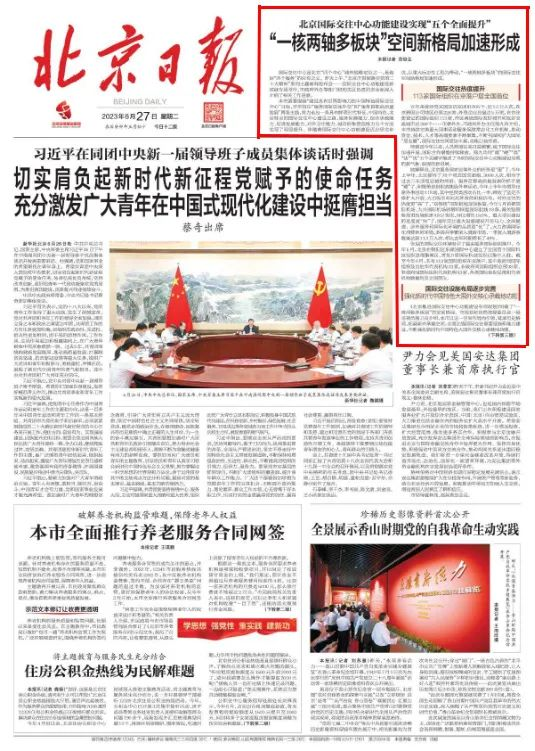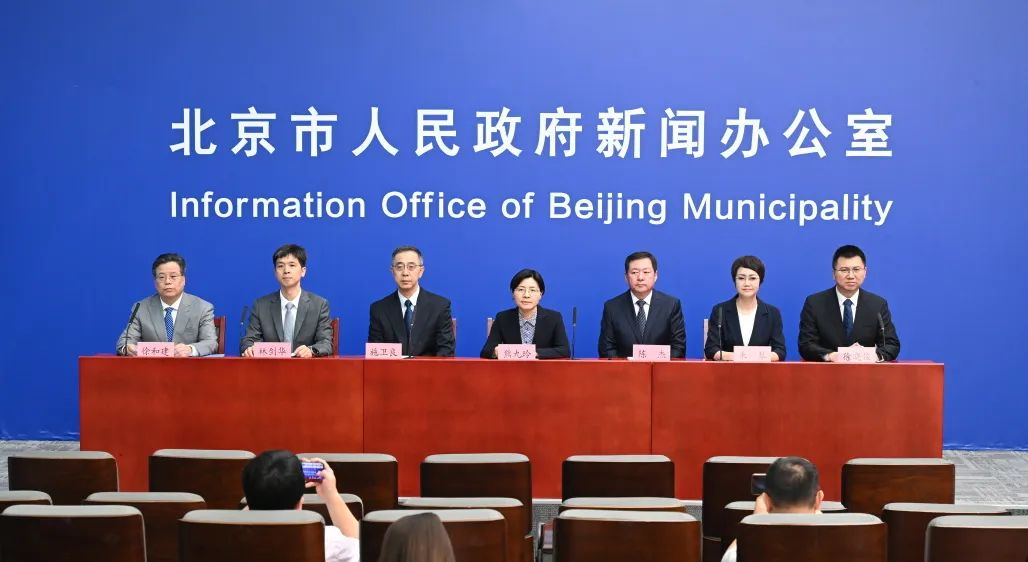
To build Beijing into the national center for international exchanges, which is one of the “four centers” of Beijing’s strategic positioning, is essential to providing the “four services”. On June 26, a special session on improving Beijing’s role as the center for international exchanges was held as part of a series of press conferences on “Beijing’s Efforts in Implementing the Guiding Principles of the 20th CPC National Congress”. Officials from the municipal government departments, such as the Foreign Affairs Office, and relevant district governments gave a comprehensive and in-depth presentation on the progress made in related endeavors.

Focused on the goal of building a center for international exchanges with Chinese characteristics and global influence and the two principal tasks of “serving China’s overall diplomacy” and “supporting the capital’s high-quality development”, Beijing strives to forge a path that reflects distinct characteristics of the times, the country, and the city. Notable improvement has been seen in the city’s ability to provide service support, serve as a comprehensive carrier, promote development, conduct external exchanges, and shape the city’s image. Additionally, solid progress made in building Beijing into a center for international exchange, driven by major signature projects, has accelerated the creation of the new spatial layout for international exchanges featuring “the Core Zone, Two Axes and Multiple Areas”.
Increased international exchanges
Beijing ranks first in China with 113 international organizations settled in the city
Over the past five years, Beijing has received 605 delegations of Party and state guests, totaling nearly 12,000 people. The city is home to the regional headquarters of 226 multinational companies and 50,000 foreign-funded enterprises. Moreover, 113 international organizations have registered in Beijing and 260 pairs of sister city ties have been established at the municipal and district levels. According to Xiong Jiuling, Director-General of the Office of Foreign Affairs Committee of the CPC Beijing Municipal Committee and Foreign Affairs Office of the People’s Government of Beijing Municipality, Beijing is working continuously to refine the regular service support mechanism for major state events, pool high-end resources such as capital, technology, and talent, and consolidate and grow its “circle of friends”. As a result, the city has expanded the space for international exchanges with improved functions.
In particular, this year has witnessed a rapid surge in cross-border personnel exchanges and offline international interactions, which unleashes the potential for more international cooperation. Xiong used five phrases to describe the encouraging progress of Beijing as the international exchanges center: heavy task, firm efforts, robust growth, faster progress, and high quality.
She emphasized Beijing’s “heavier task” of serving China’s overall diplomacy. In the first half of this year, the city hosted 78 delegations of Party and state guests, totaling around 3,000 individuals, which is twice the number of the past three years. “Firm efforts” have been made to promote the high-quality development of the capital. Beijing has actively planned and organized high-level foreign affairs activities. In the first half of this year alone, municipal leaders attended 119 foreign affairs events, half of which focused on economy and trade. This sent a clear signal, highlighting Beijing’s unwavering commitment to expanding opening-up and attracting and utilizing foreign investment. Moreover, international exchanges have witnessed “robust growth”, with expedited resumption of international air routes. In May, Beijing Capital International Airport and Beijing Daxing International Airport added and resumed a total of 18 international routes, facilitating 4,912 inbound and outbound flights under customs supervision, up by 19.8% on a month-to-month basis. Major projects, in particular those involving important facilities for international exchanges, have seen “faster progress”. In addition, foreign-related services and the internationalized environment of “higher quality” are delivered. Great efforts have been made to enhance the internationalized consumer and leisure environment and boost the inbound tourism market. In Q1, the number of inbound tourists reached 113,000, up by 49% year on year.
Such an exceptional environment for international exchanges has attracted an increasing number of international organizations to settle in Beijing. In May, China’s first headquarters cluster for international scientific and technological organizations was established at the East Lake International Center in Beijing’s Chaoyang District. The first group of eight organizations have already moved in. As of June, 113 international organizations have settled in Beijing, including 32 intergovernmental international organizations or their representative offices in China, as well as 38 headquarters and 43 representative offices of non-governmental international organizations . Beijing ranks first nationwide in terms of the number of headquarters and representative offices for various international organizations.
Gradually improved layout of facilities for international exchanges
Strengthen Beijing’s function as a core carrier of major-country diplomacy with Chinese characteristics in the new era
The Special Plan for Improving Beijing’s Role as the Center for International Exchanges clearly defines the spatial layout of “the Core Zone, Two Axes and Multiple Areas”. Shi Weiliang, Level-I Counsel of Beijing Municipal Commission of Planning and Natural Resources, stated that under the guidance of this spatial layout, the city follows the historical layout while expanding new spaces to comprehensively improve the important facilities and capabilities for international exchanges, thus continuously strengthening Beijing’s function as a core carrier of major-country diplomacy with Chinese characteristics in the new era.
In terms of the development of key areas and major projects, it’s reported that the Exhibition Center of China National Convention Center Phase II has been completed, forming a building complex featuring harmony without uniformity along with Phase I. The exterior of the BMC Theater, the east wing of the Capital Museum, and the BMC Library has been generally completed and these three places will be developed into landmarks with Chinese cultural characteristics to boost international exchanges. Efforts are being made to upgrade Yanqi Lake International Conference Resort. With the Yanqi Island project as a focus, the surrounding facilities will be upgraded. Upon completion, it is hoped that the two places can jointly host top international summits.
At the same time, each district has been making efforts to improve Beijing’s role as the center for international exchanges at a faster pace based on their respective circumstances. Lin Jianhua, Member of the Standing Committee of the CPC Haidian District Committee and Executive Vice Mayor of Haidian District, stated that Haidian integrated into the global innovation network to build itself into a core area for the international science and technology innovation center. In the past three years, the District has attracted more than 260 start-ups from overseas. Since 2020, a total of 1,026 new foreign-invested enterprises have been registered, with an additional contracted foreign investment of USD 5.79 billion, totaling USD 25.883 billion.
Shunyi District leveraged its advantages in location and resources to establish new platforms for international exchanges. Xu Xiaojun, Member of the Standing Committee of the CPC Shunyi District Committee and Vice Mayor of Shunyi District explained that the District will focus on Phases I, II, and III of the China International Exhibition Center (new venue) to build a high-quality and world-leading international exhibition and business area with exhibition and airport acting as economic drivers, and business and consumption as focus. After the completion of Phases II and Phase III, the China International Exhibition Center (new venue) will become the largest and most well-equipped comprehensive exhibition venue in Beijing.
Improved international service quality in details
Provide services to address frequently-raised issues
Providing friendly, convenient, equitable, and transparent government services to foreign enterprises and foreign nationals is an important measure to improve Beijing’s role as a center for international exchanges. Zhu Qin, Deputy Director of the Beijing Municipal Administration of Government Services, explained that the Administration pays attention to the specific needs of foreign enterprises and foreign nationals regarding investment, business operations, work, study, life, and tourism in Beijing, aiming to improve the quality of internationalized services in every detail. An international website available in eight languages was also launched to create an international online service platform that integrates information release, public services, and interaction.
The international version of the website can provide guidance for over 300 service items and appointments for more than 50 frequently-raised issues. There are 435 government service centers at the city, district, and township levels, as well as 369 foreign language service windows, offering multilingual services. The 12345 citizen service hotline can handle calls in 8 languages and the requests of foreign enterprises and foreign nationals are included in the swift-response mechanism.
“We focus on people’s feedback on our services and provide various services to address frequently raised issues,” says Zhu Qin. According to her, they accompanied the foreign enterprises and foreign nationals to go through the procedures, experiencing the service process from their perspectives to identify problems and improve the services.
In response to high demand and strong relevance of service matters, based on the one-stop reform in the city, Beijing provides clear service guidelines, optimized service processes, and convenient service access for scenarios related to foreign enterprises including establishment, taxation, capital increase, loans, patent applications, establishment of R&D centers, as well as scenarios involving foreign nationals such as the loss of passport, replacement of visas, work, and healthcare. This integrated approach makes it easier for foreign enterprises and foreign nationals to do business in Beijing.
(Reporter: Fan Junsheng)


